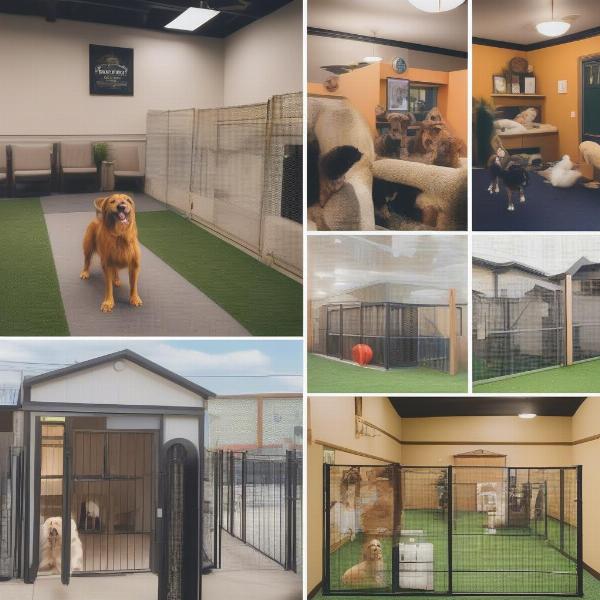Dog boarding is a necessary service for many dog owners who travel or are unable to care for their pets temporarily. Choosing the right boarding facility can be a daunting task, but with careful research and consideration, you can ensure your furry friend has a safe, comfortable, and enriching experience while you’re away. This guide will cover everything you need to know about dog boarding, from choosing the right facility to preparing your dog for their stay.
What to Look for in a Dog Boarding Facility
Finding the right dog boarding experience involves considering several key factors. First and foremost is cleanliness. A reputable facility should be clean and free of strong odors. Look for well-maintained kennels, play areas, and common spaces. Next, consider the staff. The staff should be knowledgeable, caring, and attentive to the dogs’ needs. Ask about their experience and training, and observe how they interact with the animals.
The facility’s safety protocols are also crucial. Ensure the kennels are secure and escape-proof, with appropriate fencing and supervision. Inquire about their emergency procedures and how they handle medical emergencies. Finally, consider the level of interaction and enrichment offered. Does the facility provide opportunities for socialization and play? Do they offer individual playtime or walks? A stimulating environment can help alleviate stress and boredom during your dog’s stay.
Preparing Your Dog for Boarding
Once you’ve chosen a boarding facility, it’s essential to prepare your dog for their stay. Start by ensuring your dog’s vaccinations are up-to-date. Most facilities require proof of current vaccinations against rabies, distemper, parvovirus, and kennel cough. Pack familiar items like your dog’s favorite bed, toys, and blanket. These familiar scents can help your dog feel more comfortable in a new environment.
Gradually introduce your dog to the boarding facility before their extended stay. A short visit can help them acclimate to the new smells, sounds, and surroundings. Inform the staff about your dog’s personality, dietary needs, and any medical conditions. Clear communication ensures your dog receives the individualized care they need.
Different Types of Dog Boarding
Dog boarding comes in various forms, catering to different needs and budgets. Traditional kennels offer basic accommodation with individual runs or cages. Some facilities provide more luxurious “suites” with larger spaces, comfortable bedding, and even televisions. In-home boarding offers a more personal touch, with your dog staying in a caregiver’s home. This option can be ideal for dogs who prefer a quieter, more home-like environment. Finally, doggy daycare centers provide daytime care and socialization, which can be a good option for dogs who don’t require overnight boarding.
 Different types of dog boarding
Different types of dog boarding
Making the Right Choice for Your Dog
Choosing the right dog boarding option depends on your dog’s individual needs and your budget. Consider your dog’s temperament, age, and health when making your decision. For anxious dogs, a smaller, quieter environment might be best. Energetic dogs might thrive in a facility with ample opportunities for play and socialization. dog boarding hastings offers a variety of options to suit different needs.
Conclusion
Dog boarding can be a positive experience for both you and your dog. By carefully researching and preparing, you can ensure your furry friend has a safe, comfortable, and enjoyable stay while you’re away. Remember to visit potential facilities, ask questions, and trust your instincts. Finding the right fit will give you peace of mind knowing your dog is in good hands. dog boarding shreveport la and dog boarding cape coral are excellent resources for finding reputable boarding facilities in these areas.
FAQ
- How far in advance should I book dog boarding? Booking at least a few weeks in advance, especially during peak travel seasons, is recommended.
- What should I bring to the dog boarding facility? Bring your dog’s food, medication (if any), vaccination records, favorite toys, and bedding.
- Can I visit my dog during their stay? Most facilities welcome visits, but it’s best to check their policy beforehand.
- What if my dog has special dietary needs? Inform the staff about any special dietary requirements or allergies your dog has.
- How can I help my dog adjust to boarding? A short introductory visit and bringing familiar items can help your dog feel more comfortable.
- What are the signs of a good dog boarding facility? Cleanliness, caring staff, secure facilities, and enrichment activities.
- How much does dog boarding cost? The cost varies depending on the facility, location, and type of accommodation.
dog boarding galway provides a variety of options and pricing. You can also find options at dog boarding exeter.
ILM Dog is a leading international dog website dedicated to providing dog owners with expert advice and resources on all aspects of dog care. We cover a wide range of topics, from breed selection and health care to training, nutrition, and grooming. Whether you’re a new dog owner or a seasoned pro, ILM Dog is your one-stop shop for all things canine. Contact us today for expert advice! Email: [email protected], Phone: +44 20-3965-8624. For more information visit ILM Dog.